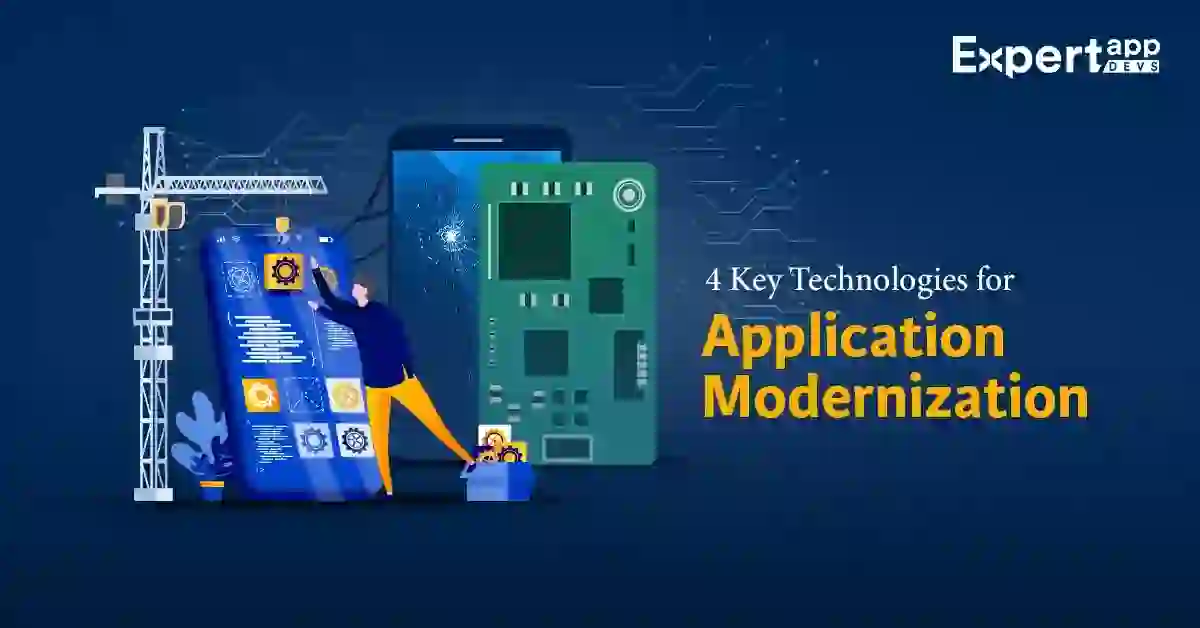Application Modernization - Top 4 Key Technologies for Application Modernization
Businesses need to re-evaluate their IT strategies in the wake of changing processes and newer business requirements. No one had imagined the move to the remote would be swift and efficient. Yet, it happened and changed the world for a different pace and thought process.
The shift to the cloud was the first step. Businesses now need more data storing capabilities, swift movement from cloud to doorstep and others. At the same time, they also need infrastructural agility, better operations and reduced costs.
If we all think the same, it would be time to consider application modernization. This is one of the core aspects of the IT transformation journey. You must plan for the applications to run on modern IT infrastructure and enhance the user's experience.
Application modernization is a holistic part, and you must consider several facets for true transformation. This guide will discuss the need for application modernization and supporting technologies. Let's get started.
What is Application Modernization?
The process by which developers upgrade the application's infrastructure to newer approaches, including Cloud computing, is application modernization.
With the modernization approach, you transfer the application from the legacy platform to a more usable and accessible platform. This will help modernize legacy applications. You will modify the internal architecture, design and features of the application.
This modernization can enhance the speed or performance of the application. As a result, customers are satisfied using the application. This can translate into better profits.
Top 5 Reasons to Adopt Application Modernization
Let's look at why you should consider application modernization for your business requirements.
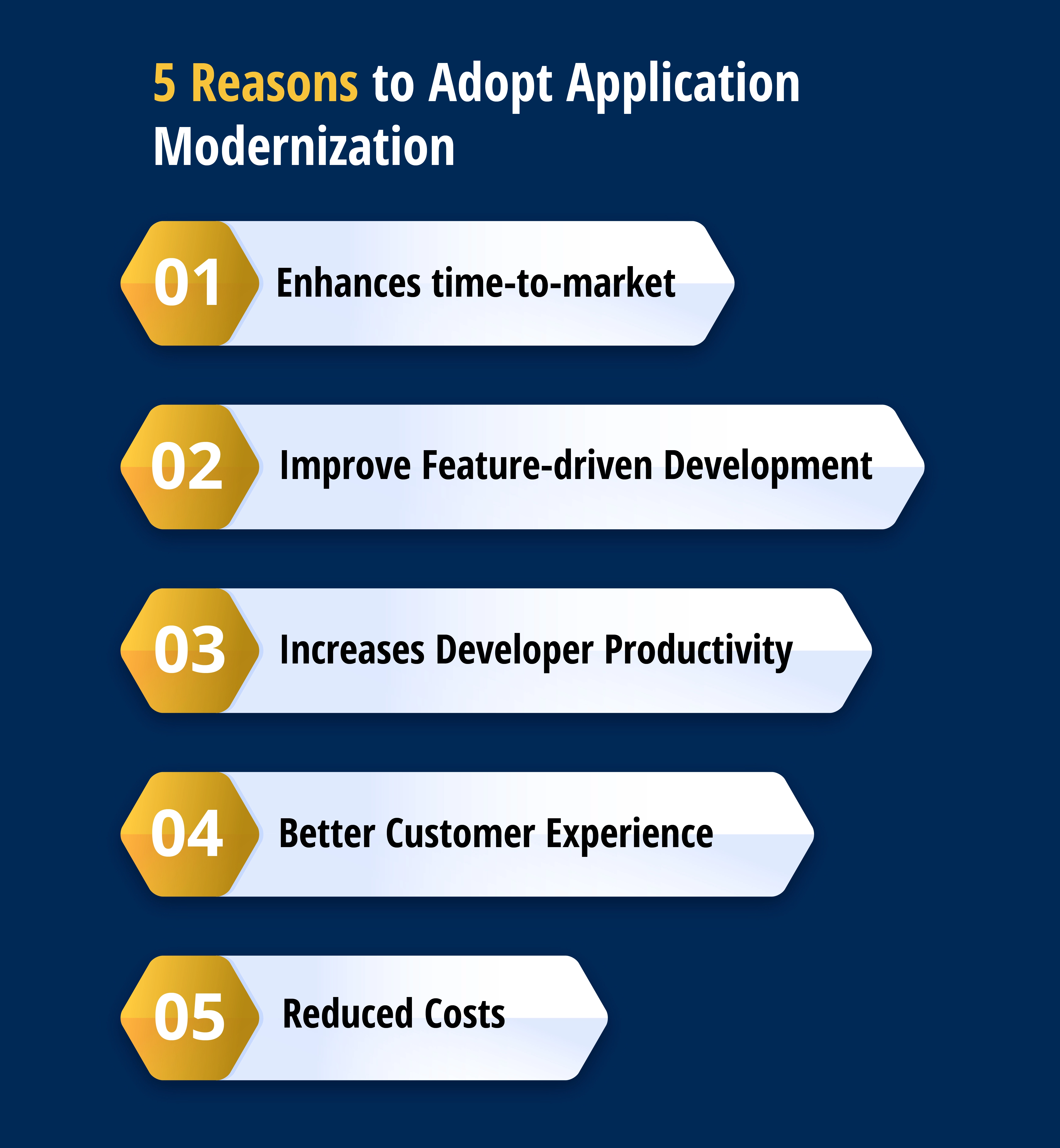
1. Enhances time-to-market
You can deploy the apps faster when you use modernized technologies such as container orchestration platforms, DevOps and others. You will use practices such as CI/CD pipelines, which will improve the development and implementation of the app.
Refactoring an application is easier and faster when you work with new technologies. It is easier to plan your upgrades and ensure rollbacks for the application. This means you are ready to roll out applications before the competition.
2. Improve Feature-driven Development
When you work with modernized technologies, you prepare your environment for future technologies. You can easily add new and better features without spending much budget. The whole technical infrastructure makes developing a feature simple and efficient.
Several future-ready platforms enable the developers and make it easier for them to develop, test and deploy features.
3. Increases Developer Productivity
The modern environment is the developer's best friend. They can leverage the application infrastructure components and build solutions necessary for them. These technologies allow the developers to automate processes, use internal libraries and minimize the actual work.
They can continue to work on innovating the product while the systems cater to their development requirements. It will enhance the overall functioning of the systems and processes.
4. Improved Customer Experience
When you use modernized technologies, you offer greater speed and excellent performance. When the user uses the application, it opens faster. They can access most features immediately.
As a result of newer and better technologies, customers can access the new trends, better technologies and simplify their experiences. It offers extensive advantages to the users. They are satisfied, which increases the retention of the business.
5. Reduced Costs
This is one of the biggest benefits of shifting to a modernized application. Greater agility and better development come at a reduced price. Your legacy application eats into your business profits.
You cannot handle the data movement from anywhere. You need experts to manage and maintain them. There is no way to automate, meaning you spend much time there.
However, application modernization is accessible and easy to develop. You can leverage cloud computing to build a system without on-premise infrastructure.
The 4 Technologies Supporting Application Modernization
If you want to leverage application modernization, include these four core technologies in your everyday business life.
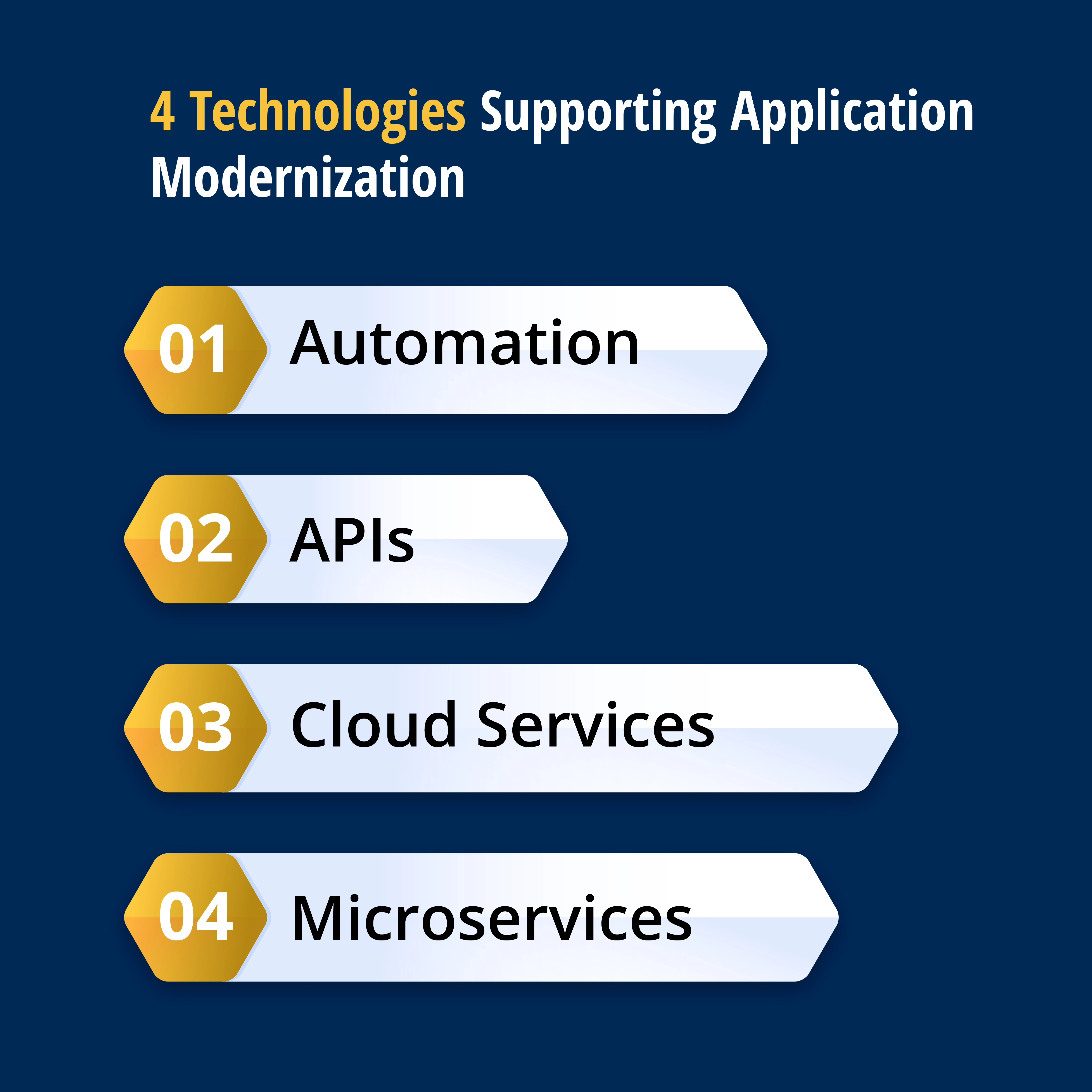
1. Automation
This is the core of building a smooth application with minimal interruptions. With automation and orchestration, you can free the developer of the mundane tasks that attack their productivity.
Automation allows you to automate the simple tasks surrounding the developer. Orchestration builds a workflow and automates the same. Using this technology, you can enhance deployment and ensure smooth application scaling.
Automation and orchestration play a pivotal role in ensuring application modernization.
- The overall productivity enhances as a result of continuous integration and delivery. This can help streamline the different processes. You can improve migrations and deployments owing to the inclusion of orchestration.
- DevOps helps improve transparency within the workflow designs and enhances the developers' productivity. Every person within the team is clear about the expectations and will strengthen the development.
- You can enable business outcomes that support the business outcome that supports your vision and mission. Eventually, you can deliver the defined value to your business customers.
Choosing the right implementation strategy is important to gain maximum value from the orchestration or automation technologies.
Check Our Portfolio: IoT Home Automation Application
2. APIs
Application programming interfaces are crucial for app-to-app communication and data sharing. This is an important technology to add new features and enhance app usability. With API technology, you can leverage cloud-based applications and improve your app.
The API systems allow you to create interactive and highly efficient backend systems. It improves content delivery and ensures better functionality. You can also scale individual parts of an application instead of the whole application. This boosts productivity and enhances your app's capability.
There are several ways in which API can benefit the application modernization strategy.
- You can create a secure boundary around your application with the right API management strategy. This will protect the app against vulnerabilities and issues. It will also enhance data encryption, which can keep a protective covering around the application.
- With the API integration, you can easily allow data movement and sharing. It enhances the speed of data caching and improves load capabilities.
- If you face integration issues, the API gateway will capably help you respond to the situation.
- It improves in-app monitoring and analytics. You have a better understanding of how your app works and all the things that make it efficient.
Read More: API Development Guide [Cost, Skills, tools and Best Practices]
3. Cloud Services
Cloud services are an important part of your application modernization strategy. They are core to your platform strategies. When modernizing applications, you move away from conventional platforms and rehost your solutions.
The cloud services will take the on-premise application. It will transform them into a cloud solution and host it with able cloud services. You will notice a greater speed when dealing with cloud hosting or development. Moreover, the services increase the developer's productivity without reducing the overall cost.
- Cloud services can enhance the data storage and retrieval capabilities of your application. It can improve the speed of queries and enhance the outcome.
- You can easily scale your application and add new features using cloud services. They enable swifter and more efficient processes in a more simplified fashion.
- The cloud can improve the accessibility of the application. The cloud facilitates this movement whether you want to get the data while traveling or access it on your device. It makes the business agile and transparent/
- Workflows can be updated and easily automated with cloud services at the core of application modernization.
- They ensure better infrastructure management, as you don't need to work on creating the infrastructure. It reduces maintenance costs too, which is one of the primary benefits of cloud services.
4. Microservices
Microservices are the key driver of application modernization. It helps deliver evolving customer needs in a simplified environment. You can easily breathe the most important solutions and scale your applications to meet newer needs with microservices. Each software is a small independent service that communicates via API in microservice.
- You can deliver to your business needs with microservices. You can add services as you require and scale your application. It is one of the fastest ways to improve application development and add newer features.
- With microservices, your entire application is divided into smaller segments. It is decentralized. As a result, you will notice that failure in a single section will not impact the other services. It will also help you focus and debug the most crucial parts of the business application.
- Microservices can help your business improve its debugging and maintenance capabilities. You can introduce the continuous delivery aspects combined with debugging to deliver error-free and engaging applications. You can improve your user's app experience by assessing and testing the apps.
Quick Strategy for Successful Application Modernization
If you plan to update legacy applications, here's a quick strategy for application modernization.
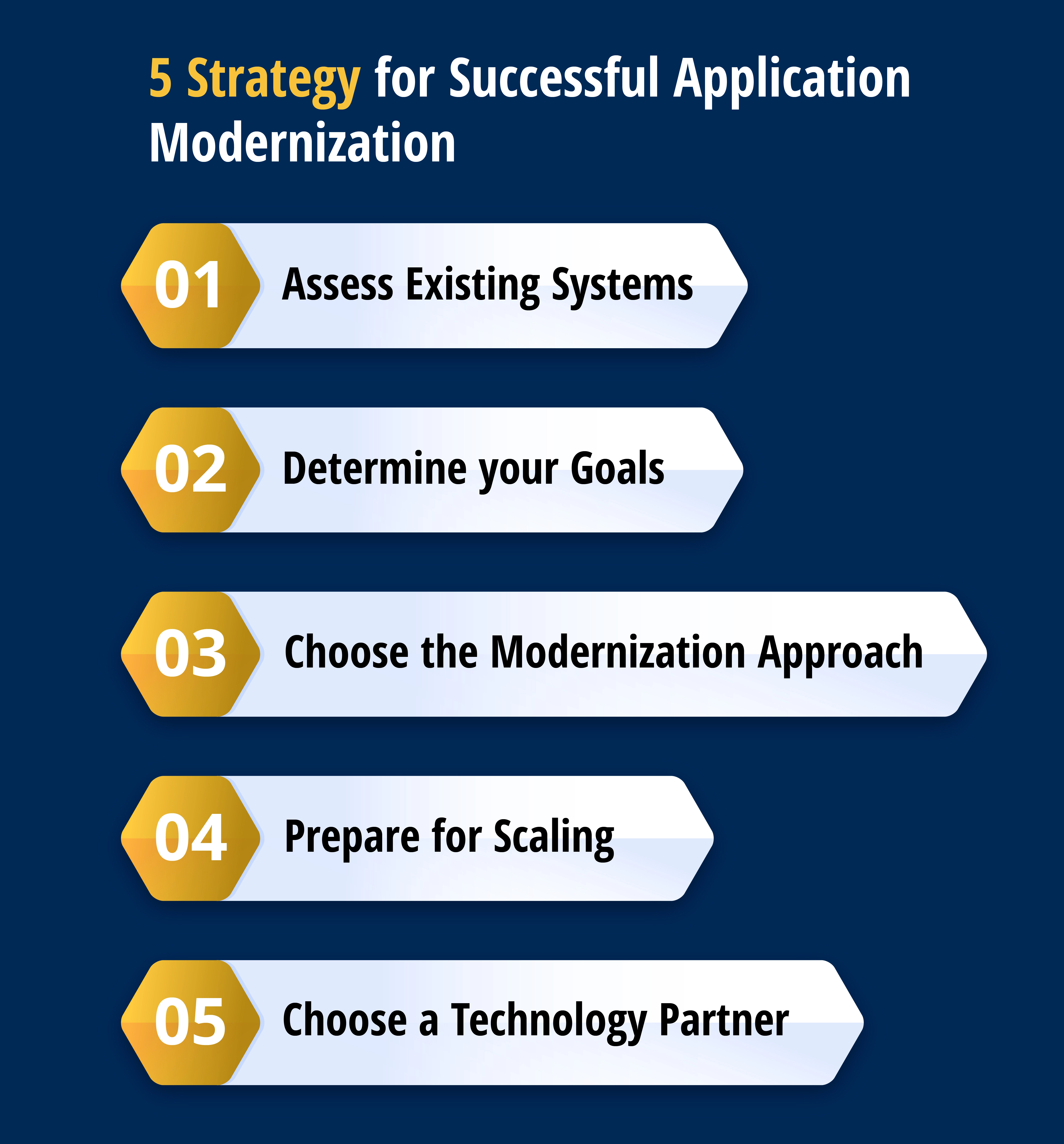
1. Assess Existing Systems
You are planning to upgrade your legacy system. Identifying the key issues you are facing with these systems is only right. You should ideally include these points in your app modernization strategy.
- Assess the problems
- know the reasons for the slowdown in the business
- Acknowledge new requirements
You need to identify the mission-critical features and systems your business cannot survive without. While assessing your systems, you need to determine the aspects that cause lowered customer experiences.
The idea is to determine the need for modernization and prepare its vision.
2. Determine your Goals
You cannot move forward with application modernization without a clear vision of your goals. What do you expect to post the modernization? Do you wish to reduce data movement time? Are you looking at reduced maintenance costs?
These aspects will determine the strategy and, eventually, the success of application modernization. You should align your goals with your business strategy. At the same time, the newer application should enable your business to meet the IT requirements posed by your evolving business.
3. Choose the Modernization Approach
Application modernization can happen in several ways. You need to evaluate the method that best fits your requirements. Do you wish to retain your application and encapsulate using an API? Do you wish to refactor or rehost the application?
Do you want to rebuild the entire application from the ground up? Each approach helps you innovatively recreate your IT strategy. They have their pros and cons. You must factor them in while deciding the approach.
4. Prepare for Scaling
When preparing your IT systems for the evolving needs, you must also prepare for the future. There is a possibility you might want to scale your business systems. With legacy systems, it was difficult to upgrade or update the systems. However, when you move forth from these systems, you want to make work processes streamlined and smooth.
There are several ways you can ensure future scaling. Microservices technology is one such method. It is very important to plan for future scalability requirements when modernizing. This will ensure that your business isn't locked into the same state.
5. Choose a Technology Partner
It is essential to modernize your application the right way. You want to ensure that the partner is perfect for your needs. Vendor vetting is important to help you modernize the application and ensure smooth sailing.
Look for someone who is experienced in application modernization strategies when planning software development. They should be proficient with the different technologies that can help enhance application development. Make sure to check their portfolio. Consult with them once before you get started with the development process.
Key Trends to Know (glance)
Here are all the trends that you must incorporate when planning the application modernization process. It can improve the effectiveness of the solution.
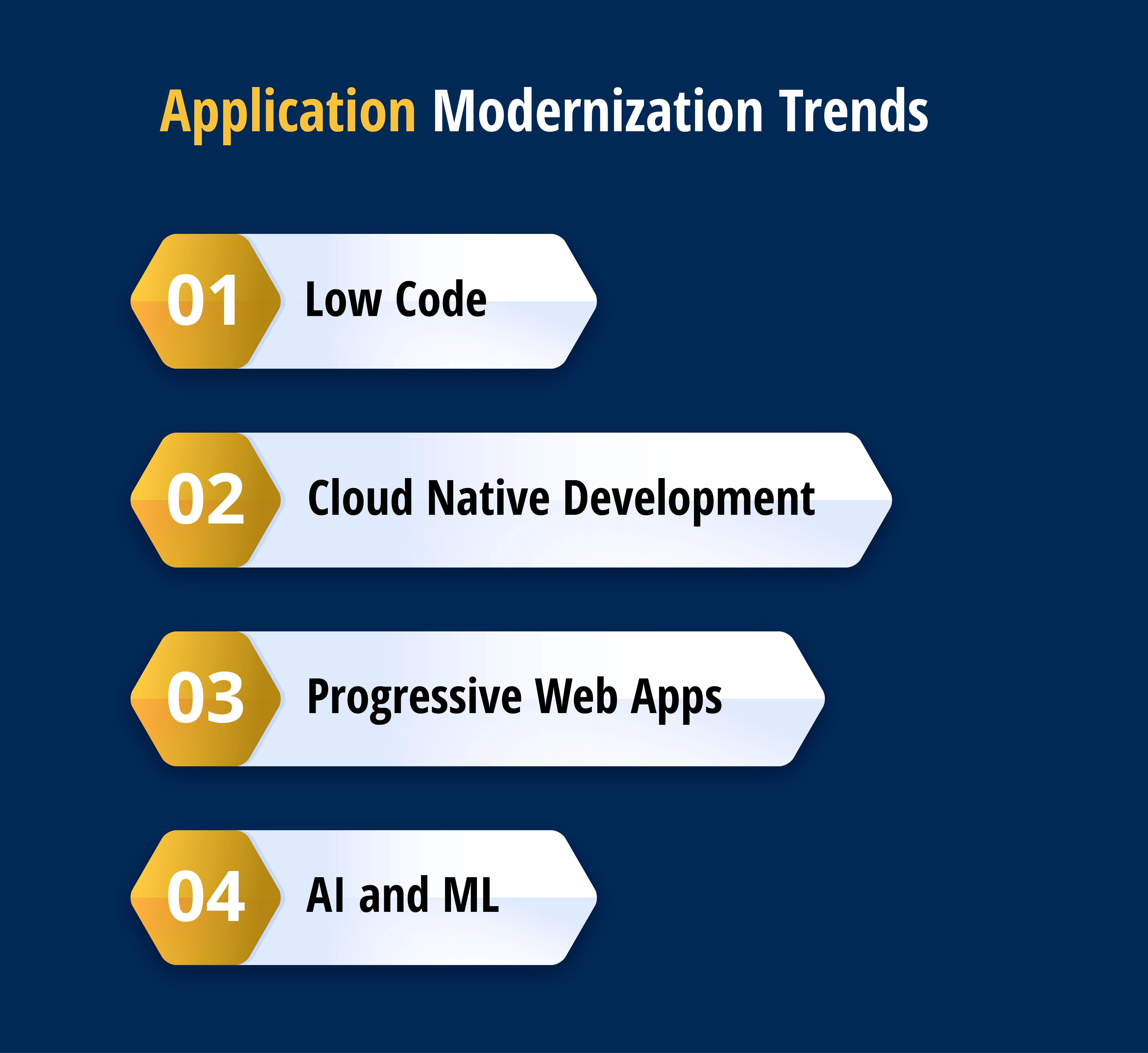
- Low Code: With low code tools, you can bring your ideas to life faster. You can enhance innovations and start working on ideas without a developer or expert team.
- Cloud Native Development: It can improve the development and deployment of the application. Your time to market is reduced, and you get to deliver simple apps to the market. You can enhance customers' experience with your applications.
- Progressive Web Apps: with this trend, you can induce better performance and enhance the application's analytics. It can also enhance the load-bearing capabilities of the application, furthering the user's experience.
- AI and ML: Technologies like AI and ML will help deliver futuristic application modernization projects. It can improve caching, predictive analytics and enhance the data-driven abilities of the app.
Conclusion
Application modernization can enable businesses to enhance their IT strategies. It will help you align the strategy to your evolving needs and customer requirements. API, cloud services, micro-services and automation are key to improving application modernization. You will notice that these technologies will uplift your application's abilities.
Expert App Devs are proficient with all the technologies. We can help assess legacy systems, evaluate the best approach and use the best-fit technology to drive modernization. Connect with our team to drive the best growth outcomes.
 Jignen Pandya
Jignen Pandya
